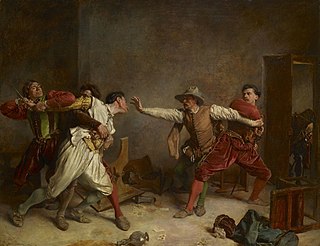In the terminology of law, an assault is the act of causing physical harm or unwanted physical contact to another person, or, in some legal definitions, the threat or attempt to do so. It is both a crime and a tort and, therefore, may result in criminal prosecution, civil liability, or both. Additionally, assault is a criminal act in which a person intentionally causes fear of physical harm or offensive contact to another person. Assault can be committed with or without a weapon and can range from physical violence to threats of violence. Assault is frequently referred to as an attempt to commit battery, which is the deliberate use of physical force against another person. The deliberate inflicting of fear, apprehension, or terror is another definition of assault that can be found in several legal systems. Depending on the severity of the offense, assault may result in a fine, imprisonment, or even death.

In many legal jurisdictions related to English common law, affray is a public order offence consisting of the fighting of one or more persons in a public place to the terror of ordinary people. Depending on their actions, and the laws of the prevailing jurisdiction, those engaged in an affray may also render themselves liable to prosecution for assault, unlawful assembly, or riot; if so, it is for one of these offences that they are usually charged.

Treason is the crime of attacking a state authority to which one owes allegiance. This typically includes acts such as participating in a war against one's native country, attempting to overthrow its government, spying on its military, its diplomats, or its secret services for a hostile and foreign power, or attempting to kill its head of state. A person who commits treason is known in law as a traitor.
Life imprisonment is any sentence of imprisonment for a crime under which the convicted criminal is to remain in prison for the rest of their natural life. Crimes that result in life imprisonment are considered extremely serious and usually violent. Examples of these crimes are murder, torture, terrorism, child abuse resulting in death, rape, espionage, treason, illegal drug trade, human trafficking, severe fraud and financial crimes, aggravated property damage, arson, hate crime, kidnapping, burglary, robbery, theft, piracy, aircraft hijacking, and genocide.
Battery is a criminal offense involving unlawful physical contact, distinct from assault, which is the act of creating apprehension of such contact.
Perverting the course of justice is an offence committed when a person prevents justice from being served on themselves or on another party. In England and Wales it is a common law offence, carrying a maximum sentence of life imprisonment. Statutory versions of the offence exist in Australia, Canada, Fiji, Ireland, and New Zealand. The Scottish equivalent is defeating the ends of justice, although charges of attempting to pervert the course of justice are also raised in Scotland, while the South African counterpart is defeating or obstructing the course of justice. A similar concept, obstruction of justice, exists in United States law.

Under the law of the United Kingdom, high treason is the crime of disloyalty to the Crown. Offences constituting high treason include plotting the murder of the sovereign; committing adultery with the sovereign's consort, with the sovereign's eldest unmarried daughter, or with the wife of the heir to the throne; levying war against the sovereign and adhering to the sovereign's enemies, giving them aid or comfort; and attempting to undermine the lawfully established line of succession. Several other crimes have historically been categorised as high treason, including counterfeiting money and being a Catholic priest.

The Treachery Act 1940 was an Act of the Parliament of the United Kingdom effective during World War II to facilitate the prosecution and execution of enemy spies, suspended afterwards, and repealed in 1968 or 1973, territory depending. The law was passed on 23 May 1940, in the month after Nazi Germany invaded France and Winston Churchill became prime minister.
Misprision of treason is an offence found in many common law jurisdictions around the world, having been inherited from English law. It is committed by someone who knows a treason is being or is about to be committed but does not report it to a proper authority.
Misprision of felony is a form of misprision, and an offence under the common law of England that is no longer active in many common law countries. Where it was or is active, it is classified as a misdemeanor. It consists of failing to report knowledge of a felony to the appropriate authorities. Exceptions were made for close family members of the felon and where the disclosure would tend to incriminate the reporter himself.

The criminal law of Canada is under the exclusive legislative jurisdiction of the Parliament of Canada. The power to enact criminal law is derived from section 91(27) of the Constitution Act, 1867. Most criminal laws have been codified in the Criminal Code, as well as the Controlled Drugs and Substances Act, Youth Criminal Justice Act and several other peripheral statutes.
The law of Northern Ireland is the legal system of statute and common law operating in Northern Ireland since the partition of Ireland established Northern Ireland as a distinct jurisdiction in 1921. Before 1921, Northern Ireland was part of the same legal system as the rest of Ireland.

The Sedition Act 1661 was an Act of the Parliament of England, although it was extended to Scotland in 1708. Passed shortly after the Restoration of Charles II, it is no longer in force, but some of its provisions continue to survive today in the Treason Act 1695 and the Treason Felony Act 1848. One clause which was included in the Treason Act 1695 was later adapted for the United States Constitution.
Compounding a felony was an offence under the common law of England and was classified as a misdemeanour. It consisted of a prosecutor or victim of an offence accepting anything of value under an agreement not to prosecute, or to hamper the prosecution of, a felony. To "compound", in this context, means to come to a settlement or agreement. It is not compounding for the victim to accept an offer to return stolen property, or to make restitution, as long as there is no agreement not to prosecute.

The Crime and Disorder Act 1998 is an Act of the Parliament of the United Kingdom. The Act was published on 2 December 1997 and received royal assent in July 1998. Its key areas were the introduction of Anti-Social Behaviour Orders, Sex Offender Orders, Parenting Orders, granting local authorities more responsibilities with regards to strategies for reducing crime and disorder, and the introduction of law specific to 'racially aggravated' offences. The Act also abolished rebuttable presumption that a child is doli incapax and formally abolished the death penalty for the last civilian offences carrying it, namely treason and piracy.

English criminal law concerns offences, their prevention and the consequences, in England and Wales. Criminal conduct is considered to be a wrong against the whole of a community, rather than just the private individuals affected. The state, in addition to certain international organisations, has responsibility for crime prevention, for bringing the culprits to justice, and for dealing with convicted offenders. The police, the criminal courts and prisons are all publicly funded services, though the main focus of criminal law concerns the role of the courts, how they apply criminal statutes and common law, and why some forms of behaviour are considered criminal. The fundamentals of a crime are a guilty act and a guilty mental state. The traditional view is that moral culpability requires that a defendant should have recognised or intended that they were acting wrongly, although in modern regulation a large number of offences relating to road traffic, environmental damage, financial services and corporations, create strict liability that can be proven simply by the guilty act.
Common law offences are crimes under English criminal law, the related criminal law of some Commonwealth countries, and under some U.S. state laws. They are offences under the common law, developed entirely by the law courts, having no specific basis in statute.
The first signs of the modern distinction between criminal and civil proceedings were during the Norman conquest of England in 1066. The earliest criminal trials had very little, if any, settled law to apply. However, the civil delictual law was highly developed and consistent in its operation.
Conspiracy to murder is a statutory offence defined by the intent to commit murder.








